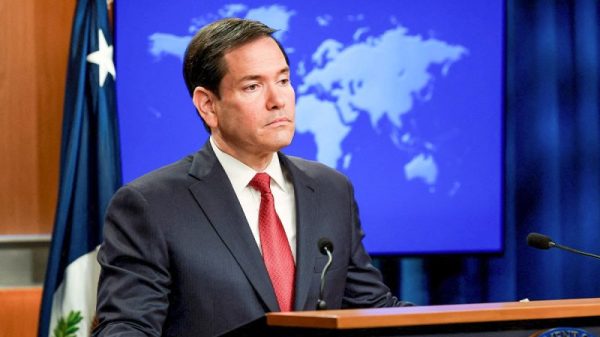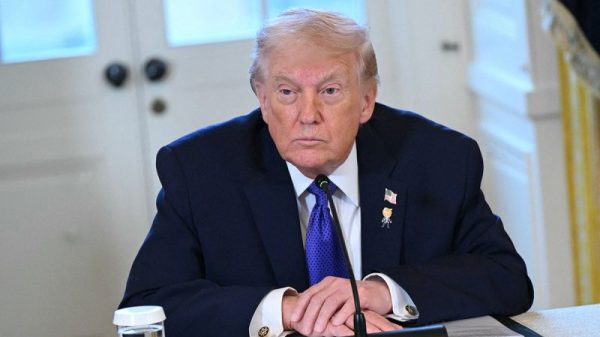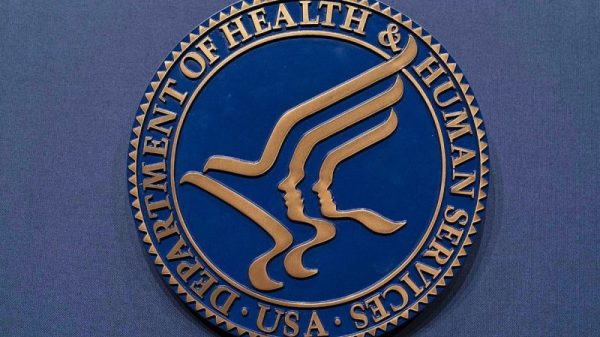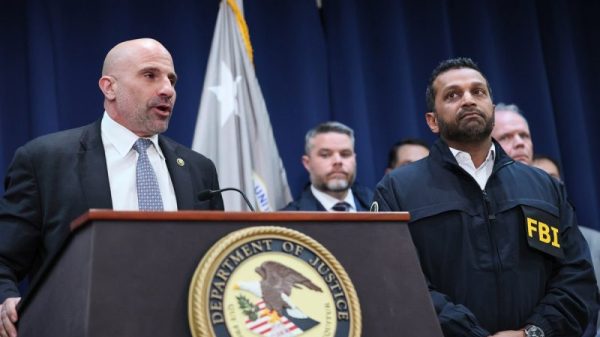GREENVILLE, N.C. — The father and son pastors, Danny and Stephen Hoell, had just returned from Israel, and it was time for the congregants gathered before them to hear what American Christians can — what they must — do to support the Jewish state in this time of peril.
“You just can’t be a Christian and watch the nation of Israel go through what they’re going through, and sit back and do absolutely nothing,” said Stephen Hoell, who in late-March was visiting his father’s church, New Life Pentecostal, here in Greenville.
“That’s right,” a few people called out from the pews. “Amen.”
Now in its seventh month of war in Gaza, Israel is facing an onslaught of criticism for the brutality of its campaign. Polls show most Americans believe Israel has a right to defend itself after Hamas’s devastating cross-border attack Oct. 7. But a growing number also think its conduct — killing tens of thousands of women and children over six months — has become unacceptable, with President Biden, congressional Democrats and even the anticipated Republican presidential nominee, Donald Trump, all voicing frustration.
To the Hoells, however, and to Christians United For Israel (CUFI) — the country’s largest Christian Zionist organization, which had deputized Stephen to deliver the evening’s presentation — no amount of criticism could dampen their devotion. They see it as incumbent on Christ’s followers to ensure Washington’s commitment to Israel doesn’t waver either — not in the face of liberal opposition nor because of political conservatives who have veered toward isolationism in matters of foreign policy.
“We’re going to hold every single one of our elected officials accountable to make sure that if there is only one nation that’s going to stand with the nation of Israel, it had better be the United States of America,” he told the congregants.
House Speaker Mike Johnson (R-La.) this month is expected to take up the issue of supplemental spending for Israel, Ukraine and other national security priorities contained in a Senate-approved package that has stalled for months amid Republican opposition to funding the war in Ukraine, and Democrats’ resistance to approving aid piecemeal.
Hundreds of pastors and Christian community leaders linked to CUFI are planning an “emergency fly-in” to Washington to lobby Johnson (R-La.), according to a person familiar with the organization’s planning, who spoke on the condition of anonymity to be candid.
CUFI has not taken a public stance on Ukraine aid, but says it has raised millions of dollars to help Jewish Ukrainians seek refuge in Israel. The organization’s leaders, who declined to comment for this article, have also conveyed to lawmakers that a package including both Ukraine and Israel aid is most likely to receive the bipartisan support it needs to pass, this person added.
Some 88 percent of White Evangelicals lean or identify as Republican, according to the Pew Research Center. But as CUFI sees it, one of the main obstacles facing the U.S.-Israel relationship on Capitol Hill lies within the Republican Party: the far-right House Freedom Caucus.
While CUFI reserves much of its venom for President Biden and Democrats, whom it has accused of “betrayal,” it has also taken aim at the Freedom Caucus, whose members have opposed Israel aid — like other foreign aid — because they “hate common sense,” the group’s nonprofit arm claimed in a recent update shared with subscribers and policymakers. In a separate update late last month, it charged Johnson with allowing the House to be “held hostage by fringe isolationist members of his own caucus,” an apparent reference to the 14 Republicans, including Freedom Caucus leaders, who earlier this year broke ranks to sink a stand-alone aid package for Israel.
Johnson, himself a churchgoing Evangelical, has said his “worldview” can be found in the “Bible off your shelf.” He has, however, resisted bringing a Senate-approved national security spending package to a vote amid fierce opposition from other conservatives determined to rein in U.S. debt.
Trump, whose closest allies in Congress belong to the Freedom Caucus, has said Israel needs to get the Gaza war “over with, and get it over with fast.”
Freedom Caucus chair, Rep. Bob Good (R-Va.), told The Washington Post he considers Israel “one of our most important allies on the world stage,” and called for Congress to continue to stand with the Jewish state “as it defends itself against this evil.”
“However at a time when we are adding a trillion dollars to our debt every 100 days, the era of borrowing for emergency spending must end,” he said. “We should support Israel responsibly” and pay for it “by cutting other unjustified, wasteful spending.”
CUFI’s founder, the Texas-based pastor John Hagee, has said that Israel’s creation in 1948 is a sign of Jesus’ imminent return to Earth. Hagee has preached that modern Israel is the manifestation of God’s will — which cannot be challenged. Among CUFI’s core beliefs is the expectation that when Jesus returns, the battle of Armageddon will ensue, after which, Jesus will rule over a Christian world from Jerusalem.
“CUFI does not stand with the nation of Israel because it’s a political issue. We stand with the nation of Israel because it is a biblical issue,” Stephen Hoell told the congregants at New Life Pentecostal.
“We are on the brink of the coming of the rapture,” his father added at the end of the presentation.
The Post was permitted to attend the event at New Life, a modest church on the rural outskirts of Greenville. But the Hoells declined to be interviewed.
Of the more than 200 events CUFI says it has sponsored since Oct. 7, most have occurred in places like this one: small- to medium-sized communities situated in solidly red — or at least purple — parts of the country.
The strategy seeks to amplify voices in support of Israel, targeting lawmakers deemed by CUFI to be most at risk of letting additional aid become a casualty of the far-right’s push for a more America First-minded foreign policy, the person familiar with the group’s plans said.
CUFI, this person added, has been in communication with Johnson’s office “consistently” and remains confident he will “ensure Israel has what it needs.”
Johnson’s office did not respond to questions about CUFI and other Evangelical groups’ outreach on the matter.
America’s pro-Israel policy has always enjoyed broad bipartisan backing, but the Gaza war has caused unprecedented strain. The Biden administration has warned of a policy shift, and some Democrats have called to slash aid, if Israel doesn’t do more to limit the staggering civilian death toll and halt an emerging famine. An important contingent of Black Evangelicals also has called for ending Israel aid, accusing it of committing a “mass genocide” in Gaza.
Such developments make any ambiguity in the Republican ranks — where most have continued to rally around Israel — all the more worrisome to Christian Zionists.
“I do think more and more individuals are concerned about isolationism, and that kind of isolationist thought appearing on Capitol Hill,” said Brent Leatherwood, who heads the advocacy arm of the Southern Baptist Convention, the largest Protestant denomination in the United States and a reliably GOP voting bloc. “I think most Southern Baptists, most Evangelicals, we understand that when America steps back from the world stage, that creates a vacuum, and far too often the vacuum is filled by evil forces,” said Leatherwood, who is not affiliated with CUFI.
Many Christians look at their lawmakers’ failure to pass supplemental assistance for Israel, Ukraine and other issues as a reflection of “Congress being largely ineffective right now, and being unable to agree on some very basic things,” Leatherwood said. “I think your average Christian is bewildered by the lack of action.”
In the darkness outside New Life Pentecostal, an electronic billboard invited people in to “learn why you should stand with Israel and what you can do to defend Israel.” From the pulpit, Stephen Hoell said he was hoping to provide congregants with tools “to be able to counter the lies” he said were advanced by Israel’s adversaries and the mainstream media.
“You hear that Israel is said to be an occupier of a land that they do not own — they’re occupying the Palestinians’ residence,” Hoell said. “Well, before I went to Israel … I wouldn’t know what to say to that.” Now he does, he added. “Let me tell you that occupiers do not dig in the ground that they’re said to occupy and find artifacts from their own people dating back 3,500 years!”
Evangelical groups like CUFI, while less prominent than the better funded Jewish lobbyist group AIPAC — consistently one of the highest contributors to political campaigns across both parties — nonetheless wield broad influence in Washington, said Anthea Butler, chair of the University of Pennsylvania’s religious studies department.
What CUFI and other Evangelical groups lobbying for Israel lack in campaign spending, relative to AIPAC, they make up for in grass-roots appeal, she said.
“It’s a different kind of power. It’s a soft power.” CUFI helps get pastors and “regular Evangelicals at home” to see how important Israel is, Butler said, and those voices filter up to Washington.
In 2023 alone, CUFI lobbied for a dozen pro-Israel bills in the House and Senate, according to the campaign finance database Open Secrets. The group claims numerous legislative and political victories, including Trump’s 2017 decision to move the U.S. Embassy from Tel Aviv to Jerusalem “after more than 135,000 CUFI members emailed the White House,” the group’s website says.
In North Carolina, the two dozen people in Stephen Hoell’s audience nodded and called out affirmatively as he spoke. But while the mostly retirement-age group were all devout Christians, they were still a long way from Capitol Hill, and Hoell seemed to anticipate their uncertainty about how they could impact national politics. “You’re sitting here thinking: ‘We’re from the country. What in the world can I do?’” Hoell said to the congregants.
“You have a chance to be a watchman on the wall,” he said. “We at Christians United for Israel, we line up with God’s mandate. We declare that for Zion’s sake, we will not keep silent.”
GREENVILLE, N.C. — The father and son pastors, Danny and Stephen Hoell, had just returned from Israel, and it was time for the congregants gathered before them to hear what American Christians can — what they must — do to support the Jewish state in this time of peril.
“You just can’t be a Christian and watch the nation of Israel go through what they’re going through, and sit back and do absolutely nothing,” said Stephen Hoell, who in late-March was visiting his father’s church, New Life Pentecostal, here in Greenville.
“That’s right,” a few people called out from the pews. “Amen.”
Now in its seventh month of war in Gaza, Israel is facing an onslaught of criticism for the brutality of its campaign. Polls show most Americans believe Israel has a right to defend itself after Hamas’s devastating cross-border attack Oct. 7. But a growing number also think its conduct — killing tens of thousands of women and children over six months — has become unacceptable, with President Biden, congressional Democrats and even the anticipated Republican presidential nominee, Donald Trump, all voicing frustration.
To the Hoells, however, and to Christians United For Israel (CUFI) — the country’s largest Christian Zionist organization, which had deputized Stephen to deliver the evening’s presentation — no amount of criticism could dampen their devotion. They see it as incumbent on Christ’s followers to ensure Washington’s commitment to Israel doesn’t waver either — not in the face of liberal opposition nor because of political conservatives who have veered toward isolationism in matters of foreign policy.
“We’re going to hold every single one of our elected officials accountable to make sure that if there is only one nation that’s going to stand with the nation of Israel, it had better be the United States of America,” he told the congregants.
House Speaker Mike Johnson (R-La.) this month is expected to take up the issue of supplemental spending for Israel, Ukraine and other national security priorities contained in a Senate-approved package that has stalled for months amid Republican opposition to funding the war in Ukraine, and Democrats’ resistance to approving aid piecemeal.
Hundreds of pastors and Christian community leaders linked to CUFI are planning an “emergency fly-in” to Washington to lobby Johnson (R-La.), according to a person familiar with the organization’s planning, who spoke on the condition of anonymity to be candid.
CUFI has not taken a public stance on Ukraine aid, but says it has raised millions of dollars to help Jewish Ukrainians seek refuge in Israel. The organization’s leaders, who declined to comment for this article, have also conveyed to lawmakers that a package including both Ukraine and Israel aid is most likely to receive the bipartisan support it needs to pass, this person added.
Some 88 percent of White Evangelicals lean or identify as Republican, according to the Pew Research Center. But as CUFI sees it, one of the main obstacles facing the U.S.-Israel relationship on Capitol Hill lies within the Republican Party: the far-right House Freedom Caucus.
While CUFI reserves much of its venom for President Biden and Democrats, whom it has accused of “betrayal,” it has also taken aim at the Freedom Caucus, whose members have opposed Israel aid — like other foreign aid — because they “hate common sense,” the group’s nonprofit arm claimed in a recent update shared with subscribers and policymakers. In a separate update late last month, it charged Johnson with allowing the House to be “held hostage by fringe isolationist members of his own caucus,” an apparent reference to the 14 Republicans, including Freedom Caucus leaders, who earlier this year broke ranks to sink a stand-alone aid package for Israel.
Johnson, himself a churchgoing Evangelical, has said his “worldview” can be found in the “Bible off your shelf.” He has, however, resisted bringing a Senate-approved national security spending package to a vote amid fierce opposition from other conservatives determined to rein in U.S. debt.
Trump, whose closest allies in Congress belong to the Freedom Caucus, has said Israel needs to get the Gaza war “over with, and get it over with fast.”
Freedom Caucus chair, Rep. Bob Good (R-Va.), told The Washington Post he considers Israel “one of our most important allies on the world stage,” and called for Congress to continue to stand with the Jewish state “as it defends itself against this evil.”
“However at a time when we are adding a trillion dollars to our debt every 100 days, the era of borrowing for emergency spending must end,” he said. “We should support Israel responsibly” and pay for it “by cutting other unjustified, wasteful spending.”
CUFI’s founder, the Texas-based pastor John Hagee, has said that Israel’s creation in 1948 is a sign of Jesus’ imminent return to Earth. Hagee has preached that modern Israel is the manifestation of God’s will — which cannot be challenged. Among CUFI’s core beliefs is the expectation that when Jesus returns, the battle of Armageddon will ensue, after which, Jesus will rule over a Christian world from Jerusalem.
“CUFI does not stand with the nation of Israel because it’s a political issue. We stand with the nation of Israel because it is a biblical issue,” Stephen Hoell told the congregants at New Life Pentecostal.
“We are on the brink of the coming of the rapture,” his father added at the end of the presentation.
The Post was permitted to attend the event at New Life, a modest church on the rural outskirts of Greenville. But the Hoells declined to be interviewed.
Of the more than 200 events CUFI says it has sponsored since Oct. 7, most have occurred in places like this one: small- to medium-sized communities situated in solidly red — or at least purple — parts of the country.
The strategy seeks to amplify voices in support of Israel, targeting lawmakers deemed by CUFI to be most at risk of letting additional aid become a casualty of the far-right’s push for a more America First-minded foreign policy, the person familiar with the group’s plans said.
CUFI, this person added, has been in communication with Johnson’s office “consistently” and remains confident he will “ensure Israel has what it needs.”
Johnson’s office did not respond to questions about CUFI and other Evangelical groups’ outreach on the matter.
America’s pro-Israel policy has always enjoyed broad bipartisan backing, but the Gaza war has caused unprecedented strain. The Biden administration has warned of a policy shift, and some Democrats have called to slash aid, if Israel doesn’t do more to limit the staggering civilian death toll and halt an emerging famine. An important contingent of Black Evangelicals also has called for ending Israel aid, accusing it of committing a “mass genocide” in Gaza.
Such developments make any ambiguity in the Republican ranks — where most have continued to rally around Israel — all the more worrisome to Christian Zionists.
“I do think more and more individuals are concerned about isolationism, and that kind of isolationist thought appearing on Capitol Hill,” said Brent Leatherwood, who heads the advocacy arm of the Southern Baptist Convention, the largest Protestant denomination in the United States and a reliably GOP voting bloc. “I think most Southern Baptists, most Evangelicals, we understand that when America steps back from the world stage, that creates a vacuum, and far too often the vacuum is filled by evil forces,” said Leatherwood, who is not affiliated with CUFI.
Many Christians look at their lawmakers’ failure to pass supplemental assistance for Israel, Ukraine and other issues as a reflection of “Congress being largely ineffective right now, and being unable to agree on some very basic things,” Leatherwood said. “I think your average Christian is bewildered by the lack of action.”
In the darkness outside New Life Pentecostal, an electronic billboard invited people in to “learn why you should stand with Israel and what you can do to defend Israel.” From the pulpit, Stephen Hoell said he was hoping to provide congregants with tools “to be able to counter the lies” he said were advanced by Israel’s adversaries and the mainstream media.
“You hear that Israel is said to be an occupier of a land that they do not own — they’re occupying the Palestinians’ residence,” Hoell said. “Well, before I went to Israel … I wouldn’t know what to say to that.” Now he does, he added. “Let me tell you that occupiers do not dig in the ground that they’re said to occupy and find artifacts from their own people dating back 3,500 years!”
Evangelical groups like CUFI, while less prominent than the better funded Jewish lobbyist group AIPAC — consistently one of the highest contributors to political campaigns across both parties — nonetheless wield broad influence in Washington, said Anthea Butler, chair of the University of Pennsylvania’s religious studies department.
What CUFI and other Evangelical groups lobbying for Israel lack in campaign spending, relative to AIPAC, they make up for in grass-roots appeal, she said.
“It’s a different kind of power. It’s a soft power.” CUFI helps get pastors and “regular Evangelicals at home” to see how important Israel is, Butler said, and those voices filter up to Washington.
In 2023 alone, CUFI lobbied for a dozen pro-Israel bills in the House and Senate, according to the campaign finance database Open Secrets. The group claims numerous legislative and political victories, including Trump’s 2017 decision to move the U.S. Embassy from Tel Aviv to Jerusalem “after more than 135,000 CUFI members emailed the White House,” the group’s website says.
In North Carolina, the two dozen people in Stephen Hoell’s audience nodded and called out affirmatively as he spoke. But while the mostly retirement-age group were all devout Christians, they were still a long way from Capitol Hill, and Hoell seemed to anticipate their uncertainty about how they could impact national politics. “You’re sitting here thinking: ‘We’re from the country. What in the world can I do?’” Hoell said to the congregants.
“You have a chance to be a watchman on the wall,” he said. “We at Christians United for Israel, we line up with God’s mandate. We declare that for Zion’s sake, we will not keep silent.”





















